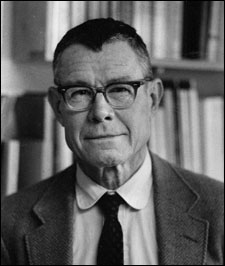FAS, Kennedy School luminary wins Nobel Prize
Schelling wins economics prize for research on game theory

The Royal Swedish Academy of Sciences awarded the prize jointly to Schelling and Robert J. Aumann of the Center for Rationality at Hebrew University of Jerusalem on Oct. 10 “for having enhanced our understanding of conflict and cooperation through game-theory analysis.” Schelling and Aumann will share the $1.29 million prize.
Schelling was a professor of economics at the Faculty of Arts and Sciences (FAS) from 1958 to 1991. In 1974, he was named the Lucius N. Littauer Professor of Political Economy – a joint FAS/Kennedy School of Government (KSG) appointment – a title he held until 1991 when on retirement he became the Lucius N. Littauer Professor of Political Economy Emeritus. Schelling is also considered one of the “founding fathers” of the Kennedy School of Government, having been one of the core group of Harvard faculty recruited to help establish the School.
“Tom Schelling’s work has transformed our understanding of conflict and cooperation, and is testament to the power of rigorous social science, and especially game theory, to inform public policy,” said Harvard President Lawrence H. Summers. “We are grateful for his extraordinary contributions to Harvard, as a scholar and teacher, as well as one of the original guiding lights of the Kennedy School of Government, and we join in congratulating him on an honor richly deserved.”
“We at the Faculty of Arts and Sciences take pride in the extraordinary achievements of our once and longtime colleague, Professor Schelling,” said William C. Kirby, dean of the Faculty of Arts and Sciences. “His acute understanding of game theory has propelled advances in the field and contributed to our hope for greater safety in the world.”
Schelling’s internationally renowned work, including his book “The Strategy of Conflict,” prompted new developments in game theory and accelerated its use and application throughout the social sciences. It also had a significant impact on governmental thinking about nuclear warfare. Schelling’s framework showed that a party can strengthen its position by overtly worsening its own options, that the capability to retaliate can be more useful than the ability to resist an attack, and that uncertain retaliation is more credible and more efficient than certain retaliation. These insights have proven to be of great relevance for conflict resolution and efforts to avoid war.
“Tom Schelling is a titan, and it is not the slightest exaggeration to say that his remarkable scholarship has made the world a safer and better place,” said David T. Ellwood, dean of the John F. Kennedy School of Government. “It should come as no surprise that such an exceptional scholar who had a profound influence on policy would be one of the founders of the modern Kennedy School. Tom’s vision and inspiration are a central part of who we are and what we aspire to be, and we could not be more pleased to see him receive this well-deserved recognition.”
“Tom was a much loved and incredibly stimulating colleague. We still marvel at his insights, at his penetrating analysis of the links between everyday individual behavior, whether brushing one’s teeth or driving a gas guzzler onto a busy highway, and its consequences for the world at large,” said Edith Stokey, KSG lecturer in public policy emerita. “He was a captivating speaker who always left one with something new to think about. For me, a Schelling seminar was – and still is – the best show in town.”
“As much as any social scientist alive, Tom Schelling’s work shows that ideas matter,” said Richard J. Zeckhauser, Frank Plumpton Ramsey Professor of Political Economy at the Kennedy School. “Moving effortlessly from real-world issues to simple but elegant models, he distilled the essence of problems ranging from nuclear deterrence and racial segregation to smoking and the valuation of life. In so doing, he helped us grapple with some of the most troubling issues confronting our world. No man did more to prevent the nuclear war that many thought inevitable between the Soviet Union and the United States in the 20th century.”
Much of Schelling’s work developed during his time at the Weatherhead Center for International Affairs. The “Strategy of Conflict,” as the book’s title page at its first printing in 1960 indicates, was published when Schelling was “Professor of Economics and Associate, Center for International Affairs, Harvard University.” Schelling joined the center and its executive committee in 1959.
His “Arms and Influence” (1966) appeared while Schelling was serving as acting director of the Center for International Affairs and co-chairman of its arms control seminar.
Jorge I. Domínguez, director of the center, said, “This is great news for Tom, his family, the profession, the universities where he has worked, and also our center.”
In addition to his work at Harvard University, Schelling has held various positions in the White House and the U.S. Executive Office of the President. He is now Distinguished University Professor at the University of Maryland, School of Public Policy.
The Kennedy School annually presents an award in Schelling’s name to honor an individual whose intellectual work has had a transformative impact on public policy.
“Tom’s remarkable work has shaped a generation of scholarship and profoundly influenced public policy,” said Ellwood. “The Schelling Award is appropriately given in his name to honor people who use reason, exceptional wisdom, and evidence to understand and solve public problems.”




